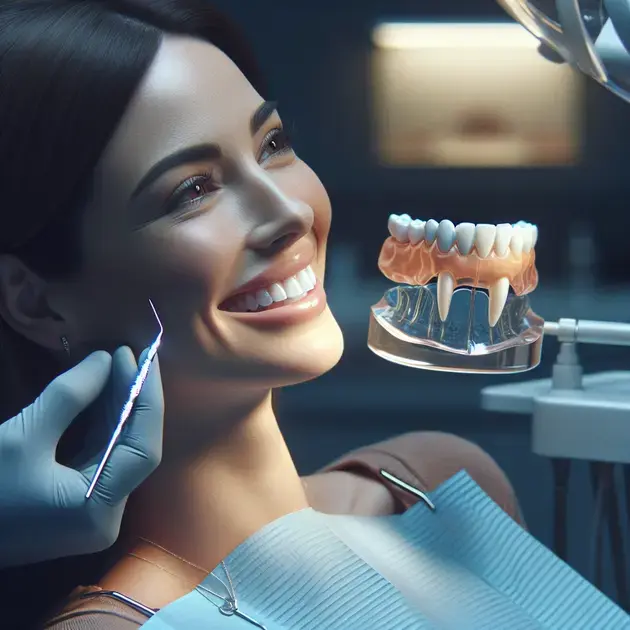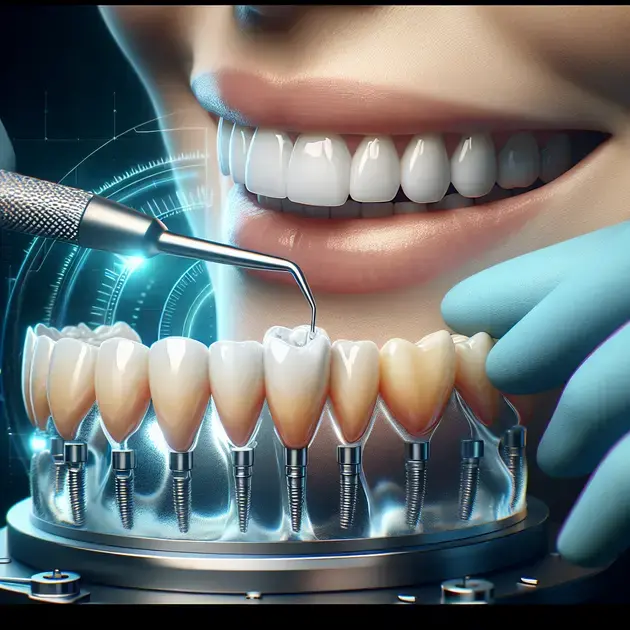Enhancing Your Smile with Crowns Dental Treatment can make a significant difference in the appearance and overall health of your teeth. Crowns are a popular dental solution that can help restore the shape, size, and strength of damaged teeth. Whether you have a cracked tooth, a large cavity, or simply want to improve the aesthetics of your smile, crowns can provide a long-lasting and natural-looking solution.
One of the latest advancements in dental technology is the use of digital scanning and 3D printing to create highly precise and custom-fit dental crowns. This means that the entire process, from preparation to placement, can be completed in a shorter amount of time compared to traditional methods. With these modern techniques, patients can experience enhanced comfort, improved accuracy, and overall better results when enhancing their smile with crowns dental treatment.

Benefits of Crowns Dental Treatment for Your Smile
When it comes to dental care, crowns can play a crucial role in restoring the appearance and functionality of your smile. Crowns are used to cover damaged or weakened teeth, providing protection and improving aesthetics. By opting for crown dental treatment, you can enjoy several benefits:
1. Improved Aesthetics
Crowns are custom-made to match the color and shape of your natural teeth, enhancing the overall appearance of your smile. This can boost your confidence and self-esteem, helping you feel more comfortable showing off your teeth.
2. Increased Strength and Durability
With a crown in place, a weakened or damaged tooth is strengthened, allowing you to bite and chew without worry. Crowns are durable and long-lasting, providing protection for many years with proper care.
3. Restored Functionality
Whether you struggle with eating certain foods or speaking clearly due to a damaged tooth, a crown can help restore proper functionality. By covering the tooth and providing a secure fit, crowns enable you to enjoy your favorite foods and speak without impediments.
4. Protection for Teeth
Crowns act as a protective barrier for vulnerable teeth, reducing the risk of further damage or decay. This can prevent the need for more extensive treatments in the future, saving you time and money in the long run.
5. Long-Term Solution
Once a crown is placed, it can last for many years if properly cared for. This makes it a cost-effective and reliable solution for enhancing your smile and maintaining optimal dental health.
Advancements in Dental Technology for Custom-fit Crowns
Thanks to advancements in dental technology, custom-fit crowns are now more precise and comfortable than ever before. Modern techniques and tools have revolutionized the crown-fitting process, offering patients a seamless experience. Here are some of the latest advancements:
1. Digital Impressions
Traditional impressions with messy materials are being replaced by digital scans that create highly accurate 3D models of the teeth. This technology ensures a custom-fit crown that matches the exact dimensions of your tooth.
2. CAD/CAM Technology
Computer-aided design and computer-aided manufacturing (CAD/CAM) technology allows for the creation of crowns in a single appointment. Using sophisticated software, the crown is designed digitally and then milled from a block of ceramic material for a precise fit.
3. 3D Printing
Some dental offices are now utilizing 3D printing technology to fabricate crowns with exceptional precision. This cutting-edge approach ensures the crown fits perfectly and offers a high level of customization for each patient.
4. Intraoral Scanners
Intraoral scanners are handheld devices that capture detailed images of the teeth and gums, eliminating the need for messy impression materials. This streamlines the crown-fitting process and enhances overall patient comfort.
5. Same-Day Crowns
With the advancements in dental technology, some practices now offer same-day crowns, allowing patients to receive a custom-fit crown in a single visit. This saves time and provides immediate results for those in need of dental restoration.
Enhanced Comfort and Faster Results with Modern Crown Procedures
Modern crown procedures have been designed to prioritize patient comfort and convenience while delivering efficient results. Advancements in dental techniques and materials have transformed the crown placement process, making it faster and more comfortable for individuals. Here’s how modern crown procedures enhance comfort and speed:
1. Minimally Invasive Techniques
Modern crown procedures often involve minimally invasive techniques that preserve more of the natural tooth structure. This helps maintain the integrity of the tooth while ensuring a secure fit for the crown.
2. Anesthesia Options
Dental practices now offer various anesthesia options to ensure patients are comfortable during the crown placement procedure. From local anesthesia to sedation dentistry, individuals can choose the option that best suits their needs and preferences.
3. Efficient Treatment Plans
With advancements in dental technology, treatment plans for crown procedures are more streamlined and efficient. This means fewer appointments and shorter chair time for patients, resulting in faster results and reduced overall treatment duration.
4. Customized Comfort Solutions
Dentists can now tailor treatment plans to provide personalized comfort solutions for patients undergoing crown procedures. Whether it’s using dental sedatives or offering relaxation techniques, the focus is on ensuring a stress-free and comfortable experience.
5. Advanced Materials
Modern crowns are made from advanced materials that not only offer durability and strength but also enhance comfort for the wearer. These materials are designed to feel natural in the mouth, minimizing discomfort and providing a seamless fit.

The Importance of Regular Dental Check-ups for Maintaining Your Smile
Regular dental check-ups are crucial for maintaining a healthy smile and preventing potential dental issues. By visiting your dentist on a consistent basis, you can ensure that any problems are identified and addressed promptly. These check-ups typically involve a thorough examination of your teeth, gums, and overall oral health. Additionally, professional cleanings can help remove plaque and tartar buildup, which can contribute to tooth decay and gum disease.
During a dental check-up, your dentist will also be able to detect any early signs of issues such as cavities, gum disease, or oral cancer. Early detection is key in preventing these conditions from progressing and causing further damage. By addressing these concerns early on, you can maintain a healthy smile and avoid more extensive and costly treatments down the line.
Furthermore, regular dental check-ups allow your dentist to monitor the overall health of your teeth and gums over time. By keeping track of any changes or developments, your dentist can create personalized treatment plans to address your specific needs. This proactive approach to dental care can help you achieve and maintain optimal oral health for years to come.
In conclusion, regular dental check-ups play a vital role in maintaining your smile and preventing dental issues. By staying proactive about your oral health and visiting your dentist regularly, you can ensure that your smile remains healthy and bright for the long term.
Tips for Keeping Your Crowns Dental Treatment Looking Fresh
After undergoing crowns dental treatment, it is important to take proper care of your new restorations to ensure they remain in top condition. Here are some tips to help you keep your crowns looking fresh:
1. Practice Good Oral Hygiene
Regular brushing and flossing are essential for maintaining the health of your crowns and preventing any issues such as decay or gum disease. Be sure to clean around the crown area carefully to remove any plaque or food particles.
2. Avoid Hard Foods
Avoid biting down on hard foods or using your teeth to open packages, as this can put unnecessary pressure on your crowns and potentially cause damage. Stick to softer foods to protect your restorations.
3. Visit Your Dentist Regularly
Regular dental check-ups are important for monitoring the health of your crowns and ensuring they are functioning properly. Your dentist can identify any issues early on and address them before they worsen.
4. Use a Mouthguard
If you grind your teeth at night, consider using a mouthguard to protect your crowns from excessive wear and tear. This can help prolong the lifespan of your restorations and keep them looking fresh.
5. Be Mindful of Staining Foods
Avoid excessive consumption of staining foods and beverages such as coffee, tea, and red wine, as these can discolor your crowns over time. If you do indulge, be sure to brush your teeth afterwards to minimize staining.
Understanding the Longevity of Crowns Dental Treatment
Crowns dental treatment is a popular restorative option for individuals looking to repair damaged or decayed teeth. Understanding the longevity of crowns involves knowing how to properly care for them and what factors can affect their lifespan.
The average lifespan of crowns can vary depending on various factors, such as the material used, your oral hygiene habits, and any habits like teeth grinding that may put additional stress on the crowns. With proper care and maintenance, crowns can last anywhere from 5 to 15 years or even longer.
Your dentist can provide guidance on how to care for your crowns, including tips on oral hygiene practices and lifestyle habits that can impact their longevity. By following your dentist’s recommendations and staying proactive about your oral health, you can help ensure that your crowns remain in good condition for years to come.
In conclusion, understanding the longevity of crowns dental treatment involves a combination of proper care, regular dental visits, and awareness of the factors that can affect their lifespan. By taking care of your crowns and prioritizing your oral health, you can enjoy the benefits of your restorations for an extended period of time.
Conclusion
In essence, regular dental check-ups are essential for the maintenance of a healthy smile and the prevention of potential dental issues. By visiting your dentist routinely, you can ensure timely identification and resolution of any problems, including the removal of plaque and tartar buildup that contributes to tooth decay and gum disease. These check-ups facilitate the early detection of cavities, gum disease, and oral cancer, allowing for timely intervention to maintain a vibrant smile and avoid extensive treatments.
Moreover, the significance of regular dental visits lies in the ability of your dentist to monitor the overall health of your teeth and gums, enabling the creation of personalized treatment plans tailored to your specific needs. This proactive dental care approach is pivotal in attaining and sustaining optimal oral health in the long run, emphasizing the importance of preventive measures in oral healthcare.
Transitioning to the care of crowns, maintaining the freshness and longevity of these restorations requires adherence to good oral hygiene practices, avoidance of hard foods that may damage them, regular dental visits for monitoring, the use of mouthguards if teeth grinding is a concern, and mindfulness of staining foods and beverages. Understanding the factors that influence the lifespan of crowns, such as material used and oral habits, underscores the necessity of proper care and maintenance to extend their durability and keep them in optimal condition over time.